Safety and Health Practicesfor Nail Salon Workers and a Training Guide for Nail Salon Worker Safety and Health Outreach Program
Safety and Health Practicesfor Nail Salon Workers and a Training Guide for Nail Salon Worker Safety and Health Outreach Program
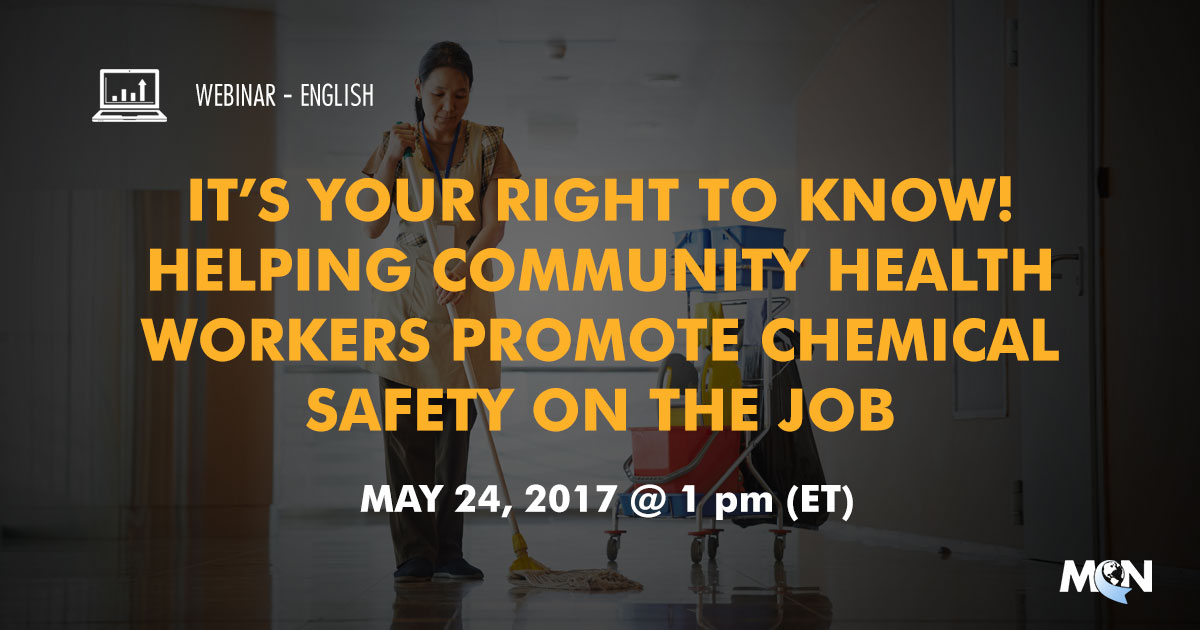
DATE: May 24, 2017, 1 pm (ET)
SPEAKERS: Juliana Simmons, MSPH, CHES
To receive CME* or CNE credit after viewing this webinar, you must:
José Navarro was excited for his new career after landing a job in the poultry industry. After five years on the job, 37 year-old Navarro began coughing up blood. He died soon after when his lungs and kidneys failed. His death triggered a federal investigation raising questions about the health risks associated with the use of toxic chemicals in poultry plants.
Millions of workers are exposed to chemicals everyday on the job. All workers have the right to know about the chemicals they work with and community health workers can be an important source of information and support for workers. This workshop will teach community health workers how to explain what happens when someone is exposed to chemicals and how workers can best protect themselves
This project is supported by the Health Resources and Services Administration (HRSA) of the U.S. Department of Health and Human Services (HHS) under cooperative agreement number U30CS09742, Technical Assistance to Community and Migrant Health Centers and Homeless for $1,094,709.00 with 0% of the total NCA project financed with non-federal sources. This information or content and conclusions are those of the author and should not be construed as the official position or policy of, nor should any endorsements be inferred by HRSA, HHS or the U.S. Government.
DATE: May 10, 2017, 1 pm (ET)
SPEAKERS: Patria Alguila and Ileana Ponce-Gonzalez, MD, MPH, CNC
To receive CME* or CNE credit after viewing this webinar, you must:
In this webinar participants will be able to identify the Health Resource Services Administration performance measures related to depression, describe symptoms of depression, understand how to encourage patients to control and manage their diabetes and depression, and understand the principle barriers faced by patients in the control and management of their diabetes and depression
This project is supported by the Health Resources and Services Administration (HRSA) of the U.S. Department of Health and Human Services (HHS) under cooperative agreement number U30CS09742, Technical Assistance to Community and Migrant Health Centers and Homeless for $1,094,709.00 with 0% of the total NCA project financed with non-federal sources. This information or content and conclusions are those of the author and should not be construed as the official position or policy of, nor should any endorsements be inferred by HRSA, HHS or the U.S. Government.

FECHA DE GRABACION: 3 de Mayo de 2017, 1 pm ET (zona horaria del Este)
ORADORAS: Ileana Ponce-Gonzalez, MD, MPH y Daniel Ramos, MPH
Para recibir credito de Trabajador/a de Salud Comunitaria o Educacion de Continua de Enfermera después de ver alguno de estos seminarios usted debe hacer lo siguiente:
En este seminario los participantes podrán identificar las medidas de desempeño de la Administración de Servicios de Recursos de Salud relacionadas con la depresión, podrán describir los síntomas de la depresión, entender cómo alentar a los pacientes para que ellos mismos puedan controlar su diabetes y depresión, y comprender las barreras principales que enfrentan pacientes con diabetes en el control y manejo de su enfermedad y la depresión.
Este proyecto cuenta con el apoyo de la Administración de Recursos y Servicios de Salud (HRSA) del Departamento de Salud y Servicios Humanos de los Estados Unidos bajo el acuerdo de cooperación número U30CS09742, Asistencia Técnica a Centros de Salud Comunitarios y Migrantes y Personas sin Hogar por $ 1,094,709.00 con 0% del total Proyecto NCA financiado con fuentes no federales. Esta información o contenido y las conclusiones son las del autor y no deben ser interpretadas como la posición o política oficial de, ni cualquier endosos deben ser inferidos por HRSA, HHS o el Gobierno de los Estados Unidos.
"Emerging Infectious Diseases is an open access journal published monthly by the Centers for Disease Control and Prevention (CDC)." ... "Emerging Infectious Diseases follows the International Committee of Medical Journal Editors recommendations for the conduct, reporting, editing, and publishing of scholarly work in medical journals. The journal’s peer review process allows for critical assessment of submitted manuscripts by experts who are usually not part of its editorial staff. As an independent publication, the journal’s peer-review process operates independently from CDC’s clearance processes."

FECHA DE GRABACION: 29 de Marzo de 2017, 1 pm ET (zona horaria del Este)
ORADORA: Ileana Ponce-González, MD, MPH, CNC
Para recibir credito de Trabajador/a de Salud Comunitaria o Educacion de Continua de Enfermera después de ver alguno de estos seminarios usted debe hacer lo siguiente:
En este seminario los participantes serán capaces de identificar las medidas de rendimiento de HRSA relacionadas con la salud bucodental, así como los factores de riesgo para la mala salud bucal. También reflexionaremos sobre el importante papel que desempeñan los promotores de salud en la mejora del acceso a los servicios de salud bucodental.
Este proyecto cuenta con el apoyo de la Administración de Recursos y Servicios de Salud (HRSA) del Departamento de Salud y Servicios Humanos de los Estados Unidos bajo el acuerdo de cooperación número U30CS09742, Asistencia Técnica a Centros de Salud Comunitarios y Migrantes y Personas sin Hogar por $ 1,094,709.00 con 0% del total Proyecto NCA financiado con fuentes no federales. Esta información o contenido y las conclusiones son las del autor y no deben ser interpretadas como la posición o política oficial de, ni cualquier endosos deben ser inferidos por HRSA, HHS o el Gobierno de los Estados Unidos.
Includes EPA manual "How to Comply With the 2015 Revised Worker Protection Standard For Agricultural Pesticides - What Owners and Employers Need To Know" and an excerpt specifically for clininicians regarding medical evaluation and respirator fit test. See also the medical evaluation questions in English and Spanish.
DATE: February 21, 2017
SPEAKERS: Ed Zuroweste, MD
To receive CME* or CNE credit after viewing this webinar, you must:
Agriculture is also one of the most dangerous industries in the United States. For vulnerable populations working in agriculture, their lack of training, poor safety precautions, regulatory exclusions, lack of health insurance, language barriers, piece-rate pay, immigration status, and geographical and cultural isolation can put these workers at increased risk for occupationally related injuries and illnesses and chronic sequelae. Exposure to pesticides and other contaminants is a particular concern to agricultural workers and their families. This continuing education training will discuss health risks facing immigrant and migrant agricultural workers and their families as a result of their working conditions and environment, with a particular focus on Kansas. It will also highlight best practices and resources for the incorporation of environmental and occupational health in the practice setting, showcasing successful initiatives in primary care settings. Participants will explore the importance of and become familiar with the methods to integrate environmental and occupational health into the practice setting from the clinical perspective as well as consider these issues within the framework of social determinants of health.
This material was produced, in part, under Assistance Agreement No. X883487601 awarded by the U.S. Environmental Protection Agency. It has not been formally reviewed by EPA. EPA does not endorse any products or commercial services mentioned in this product.
Free and confidential consultation for clinicians from the Clinician Consultation Center at San Francisco General Hospital focusing on substance use in primary care
Objectives of the Substance Use Warmline:
Consultation topics include:
The CCC’s multi-disciplinary team of expert physicians, clinical pharmacists and nurses provides consultation to help clinicians manage complex patient needs, medication safety, and a rapidly evolving regulatory environment.
Learn more at http://nccc.ucsf.edu/clinician-consultation/substance-use-management
This 90-minute webinar was created for physicians, nurses, and other health professionals who treat and case manage patients with active TB. The webinar introduced the 2016 Official American Thoracic Society/Centers for Disease Control and Prevention/Infectious Diseases Society of America Clinical Practice Guidelines: Treatment of Drug-Susceptible Tuberculosis. This training highlighted the guidelines development process, the key changes in recommendations, and discussed the evidence supporting the changes. The webinar was originally presented on November 4, 2016. This training was jointly sponsored by all 5 RTMCCs.
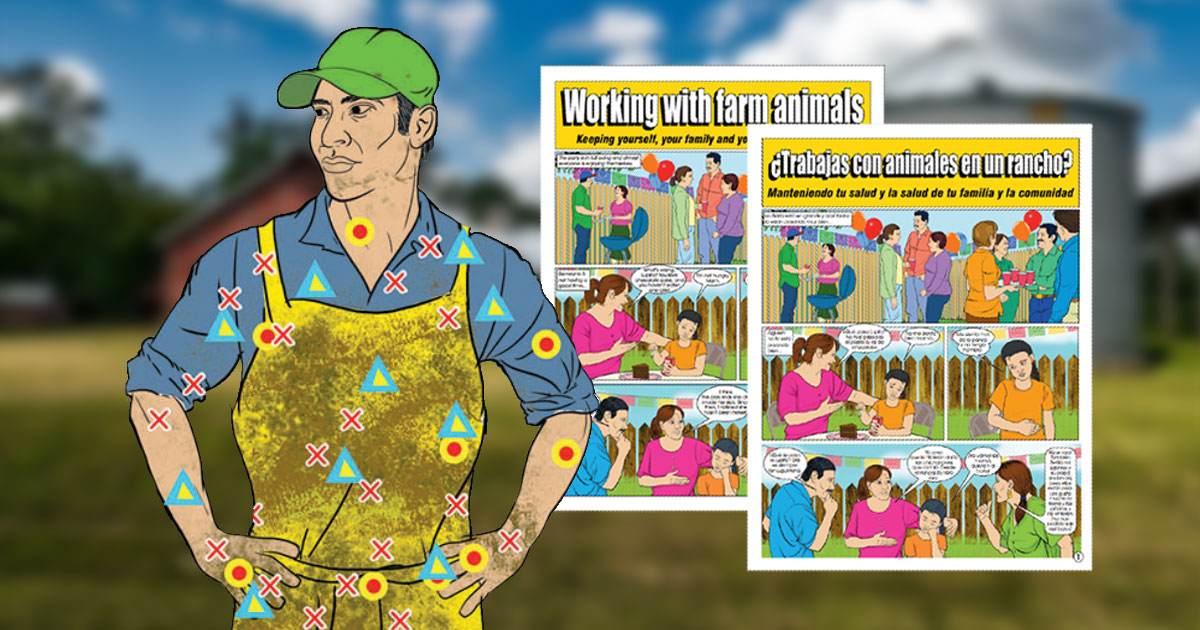
Libro cómic educativo bilingüe sobre cómo prevenir las enfermedades zoonóticas. Desarrollado por MCN en colaboración con la Universidad Estatal de Ohio.
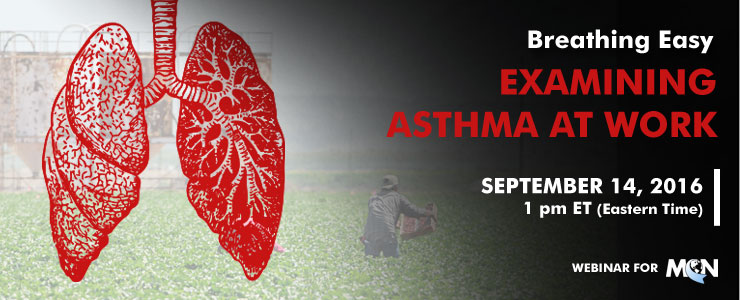
DATE RECORDED: September 14, 2016 at 1 pm ET
PRESENTED BY: Robert Harrison, M.D., M.P.H.
This material will be produced under grant number SH-27640-15-60-F-48-SH5 from the Occupational Safety and Health Administration, U.S. Department of Labor. It will not necessarily reflect the views or policies of the U.S. Department of Labor, nor does mention of trade names, commercial products, or organizations imply endorsement by the U.S. Government.

DATE RECORDED: September 14, 2016 at 1 pm ET
PRESENTED BY: Robert Harrison, M.D., M.P.H.
This material will be produced under grant number SH-27640-15-60-F-48-SH5 from the Occupational Safety and Health Administration, U.S. Department of Labor. It will not necessarily reflect the views or policies of the U.S. Department of Labor, nor does mention of trade names, commercial products, or organizations imply endorsement by the U.S. Government.
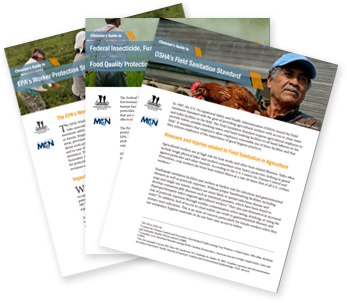
MCN y Farmworker Justice ofrecen estas guías para ayudar a los médicos en la comprensión de regulaciones de salud y seguridad de los campesinos. Información de los Estándares de Saneamiento de la Administración de Seguridad y Salud Ocupacional (OSHA) para los campos; la Ley Federal de Insecticidas, Fungicidas y Rodenticidas (FIFRA) regulado por la Agencia de Protección Ambiental (EPA); la Ley de la Protección de la Calidad de los Alimentos (FQPA) también regulado por el EPA; y el estándar de protección del trabajador (WPS) establecido por el EPA.
A CDC resource page where there is current Zika updates and resources.

MCN and Farmworker Justice offer these guides to assist clinicians in understanding farmworker health and safety regulations. OSHA’s Field Sanitation Standard; EPA's Federal Insecticide, Fungicide, and Rodenticide Act (FIFRA); EPA's Food Quality Protection Act (FQPA); EPA’s Worker Protection Standard (WPS).
From the 2016 International Union Against Tuberculosis & Lung Disease Conference
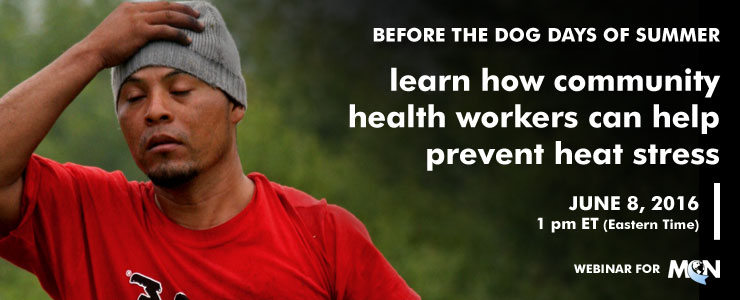
DATE RECORDED: June 8, 2016
PRESENTED BY: Juliana Simmons, MSPH, CHES
This material will be produced under grant number SH-27640-15-60-F-48-SH5 from the Occupational Safety and Health Administration, U.S. Department of Labor. It will not necessarily reflect the views or policies of the U.S. Department of Labor, nor does mention of trade names, commercial products, or organizations imply endorsement by the U.S. Government.
As part of the response to the Zika outbreak, CDC, in collaboration with state, local, tribal, and territorial health departments, established a pregnancy registry for comprehensive monitoring of pregnancy and infant outcomes following possible Zika virus infection. The registry is an active surveillance system of pregnant women with laboratory evidence of possible Zika virus infection in the 50 US states and DC, and in the US territories. On May 20, 2016, CDC released detailed information about the registry and will initiate weekly reporting of the number of pregnant women followed in the registry.
In 2015, for the first time in over 20 years, the Environmental Protection Agency updated the Worker Protection Standard (WPS). The WPS provides basic workplace protections for agricultural workers to reduce the risk of pesticide exposre. This issue brief overviews the major revisions that are particularly relevant for clinicians caring for agricultural workers.

Available in English and Spanish
Available in English and Spanish and Haitian Creole
Older Guides:
Available in English, Spanish, and Haitian Creole for workers on employer-provided health insurance
Created by Farmworker Justice.
The National LGBT Health Education Center provides educational programs, resources, and consultation to health care organizations with the goal of optimizing quality, cost-effective health care for lesbian, gay, bisexual, and transgender (LGBT) people.
http://www.cdph.ca.gov/programs/cosmetics/Pages/default.aspx
An online, searchable database that allows salon workers and others to learn about and report toxic chemicals found in nail salon products and other cosmetics.
A Tip Sheet by Health Outreach Partners and MHP Salud.
Migrant Clinicians Network, Inc. (MCN) will work during the next two years to engage members of our clinical network and all relevant stakeholders to advance health justice for the mobile poor. Our advocacy and education priorities focus on safe and legal entry into the United States, as well as strong and equal protection for workers in all occupations. Advancement in these areas creates the greatest opportunity for all to access high-quality, affordable healthcare.
Spanish-language skin cancer outreach materials from the American Academy of Dermatology, which are used during their public skin cancer examinations. Their pilot program providing examinations, targeting Hispanic outdoor workers in California, Arizona, Texas and Florida, was featured in MCN's Streamline, Autumn 2014.
Messages to Millions is designed to provide consistent, science-based Million Hearts® messages to disseminate to partners and supporters on a quarterly basis. Message maps provide key and supporting messages that stress the steps that can be taken by consumers, health care providers, and other audiences to help prevent heart attacks and strokes.
This new guide from the National Center for Medical-Legal Partnership is intended to help civil legal aid practitioners message their work to health care audiences in order to build stronger cross sector medical-legal partnerships and to encourage investment in that work.